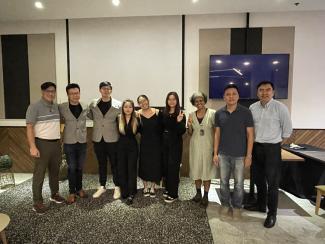
Digitalisation does not just improve efficiency but can also boost sustainability by reducing water wastage for a large institution.
This was demonstrated in the winning project for the DELL Technologies Academy Cloud Native Experience Award, given out on 4 May 2023 to the best project in the SMU-X course for the Information Systems (IS) Project Experience Programme, which includes the IS Project Experience (IS483) and IS Application Project Fintech (IS484) modules.
IS483 and IS484 are IS project experience modules, which are compulsory modules for Information Systems students. These SMU-X modules aim for the students to work with an external project sponsor to develop and scope a solution to the business problem and prototype the solution within one semester.
This award was originally conceived to recognise students who use their computing skills to help businesses achieve greater efficiency, saving time and money. The winning group comprising five students worked with Ngee Ann Polytechnic to help streamline the process of reporting water leaks for the facilities management (FM) department. Currently pursuing their Bachelor of Science in Information Systems, the five students are Kaniel Koh Wei Zhe, Clark Koh Si Jie, Shinta Karolina Bek, Huang Jing Yi and Sherrill Tan Kai Hui. They will be graduating in 2024.
Using Telegram and Tableau for faster reporting of leakages
In 2019, Ngee Ann Polytechnic (NP) launched its Integrated Operations Centre (IOC), using IoT and various smart technologies to monitor multiple aspects of the campus, namely security surveillance and utility consumption.
To reduce water leakage, NP’s FM team had to deploy FM staff to collect data onsite, and work with domain experts to troubleshoot before rectifying the leakage – leading to a turnaround time which can take a few days.
The project helped the FM team to overcome this pain point by building a web application to provide them with data on NP’s water consumption. Besides the fact that the application is easily accessible from the comfort of team members’ laptops and mobile devices, the data must be pre-processed and represented on the web application using data visualisation tools so that they can be interpreted easily. This will aid the FM team in reducing the time needed to rectify the leakage and glean insights to improve their decision-making process.
By using Telegram to communicate about leakages and data visualisation tools like Tableau to present the data, the group cut the turnaround time spent in reporting and identifying water leaks by about 12 hours a month, saving the polytechnic about $2,000 a year in resources used for maintenance.
The project has won praise from NP’s FM staff as a result. “We're thrilled with the results and highly recommend this tool to businesses looking to improve their water management practices,” said Mr Toh Joo Wah, NP’s Data Engineer for its FM team. His colleague, Mr Keck Meng Teck, a Real Estate Manager, added that the user-friendly interface and detailed analytics in the dashboard helped them to make informed decisions about water conservation and maintenance.
Taking feedback well
Mr Pavneet Singh Bedi, an Adjunct Faculty Member who is also the Capstone Project Supervisor for Kaniel and his team solved, said the project is an important business challenge for NP. “Enriching NP’s IOC with actionable and easy-to-use analytics helps them become more efficient. This also shows how digitalisation can help boost sustainability in the use of water in a climate-sensitive time.”
Kaniel, the team leader, said that one challenge his team faced was delving into new technologies the team had no experience in, such as tools like Tableau and Telegram and learning to use their APIs. “Winning the award still feels unreal to us,” he said.
Another group in the competition presented the use of cloud-native skills to help a smart building solutions company, Gnosis Analytics, adjust the lighting in an HDB corridor, based on the light in the surrounding environment. The team sought to achieve reusability, reliability, and scalability of their solution.
Since 2021, Dell Technologies and SMU have collaborated to boost students’ employability with cloud-native skills. As businesses ramp up the use of digital technology, students need to be armed with in-demand computing skills, including emerging technologies such as cloud-native skills, to value-add as businesses transform.